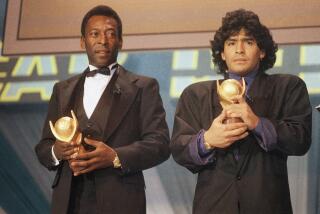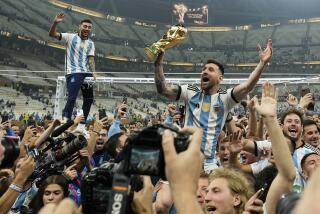Argentina, England Resume Rivalry
PARIS — It is one of those moments in sports forever frozen in time--Peter Shilton and Diego Maradona suspended in midair for all eternity.
The English goalkeeper leaping a fraction of a second too late, his right arm extended to punch away the ball. The Argentine midfielder, eyes closed, left arm raised, leaping just in time to . . . slap the ball into the net, breaking every rule of sportsmanship and fair play ever written.
And getting away with it.
Maradona’s “hand of God” goal is one of the great moments in World Cup history, albeit for the wrong reason. If the 1986 tournament in Mexico is remembered for nothing else, it is remembered for that.
Never mind that Maradona scored a second goal, this one perfectly legal, after dancing through virtually half the English team in a stunning solo effort. It was that first goal that stunned the 114,580 fans at Azteca Stadium.
Not to mention the English players, who walked off the field that broiling afternoon as 2-1 losers on the scoreboard but moral victors in their hearts.
One of those players, Glenn Hoddle, will lead England’s team out onto the field today in Saint-Etienne in the first World Cup clash between England and Argentina since that infamous game in Mexico City a dozen years ago.
Almost incredibly, unlike every Englishman this side of the nearest fish-and-chips shop, Hoddle, now England’s coach, says he is not thinking revenge.
“I’ve never used the word ‘revenge,’ ” Hoddle said Sunday. “It’s a horrible word and I don’t like it. Redressing the balance is what I’m talking about, turning that result around and getting it out of our systems. . . . That moment has stayed with us for a long time.”
Nor does Hoddle blame Maradona for what he did.
“It was a sickening blow, but I don’t think there was one of us who ever blamed Maradona for what happened,” he said. “It was just an instinct. He probably thought he was going to get booked [yellow-carded] for it.
“It was the officials, and especially the Tunisian referee [Ali Ben Nasser], who were the problem.”
Because they blew the call, England was knocked out in the quarterfinals. Now it wants to return the favor and prevent Argentina, one of the France 98 favorites, from advancing to the quarterfinals.
Whatever happens tonight, it will be merely the latest chapter in one of international soccer’s fiercest rivalries.
The fuse was lighted in 1966, when England was the host nation for the World Cup and Alf Ramsey, later knighted for his services to the game, was England’s coach.
The teams met in the quarterfinals at Wembley and the Argentines, although a skilled side, had a reputation for on-field violence.
“At any moment, for no reason, you thought you might be attacked from behind,” Geoff Hurst, who went on to become the only man in history to score a hat trick in the World Cup final, said at the time.
Added Bobby Moore, then England’s captain, “They did tug your hair, spit at you, poke you in the eyes and kick you when the ball was miles away and no one was looking.”
The game was hard-played and German referee Rudolf Kreitlein had his hands full. Finally, his patience wore thin and he red-carded Argentina’s captain, massive and menacing defender Antonio Rattin, who argued long and loud before stomping off.
After England had scored a 1-0 victory, Ramsey would not allow his players to exchange shirts with the Argentines and later, in a comment that still echoes, said teams should not “act like animals.”
The countries met again in 1977 at Buenos Aires, where an English player managed the unusual feat of getting his two front teeth knocked out and being yellow-carded at the same time. Call it retribution.
The 1982 war over the Falkland Islands did not help relations between the nations, although Argentine players and coaches still were welcome in England and greatly admired for their skills.
Then came 1986 and that goal.
Tonight, England faces an Argentine team that has one of the best disciplinary records in the tournament and, with players such as Gabriel Batistuta, Ariel Ortega, Juan Veron and Claudio Lopez, would be worthy winners.
But justice calls for the scales to be righted.
*
To get updates on all of today’s World Cup games on The Times’ Web site, go to: http://161.35.110.226/worldcup







